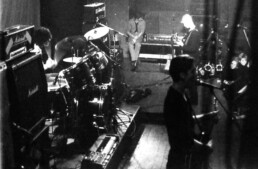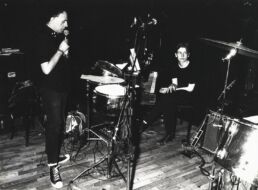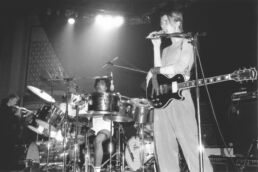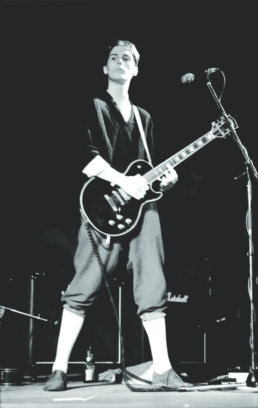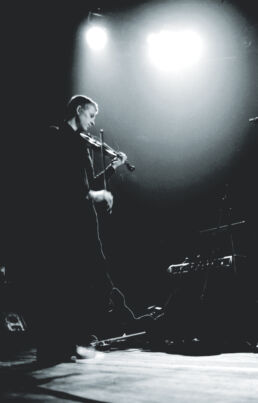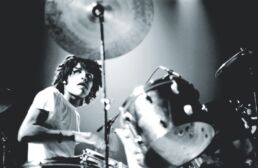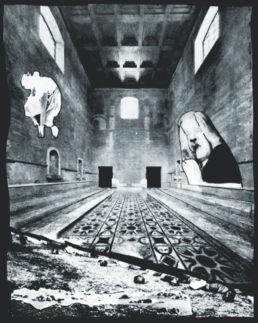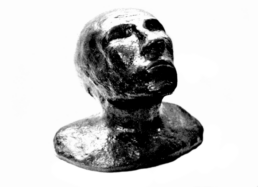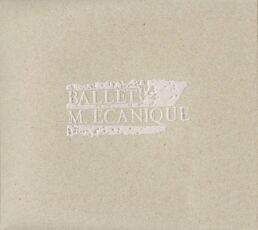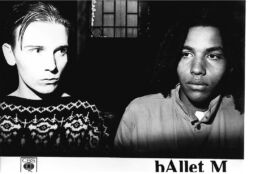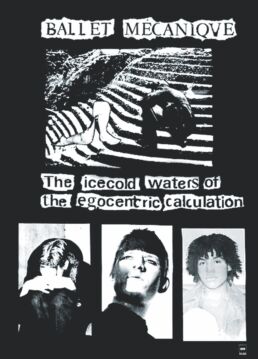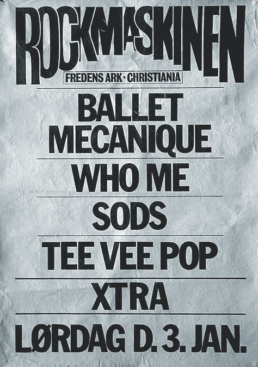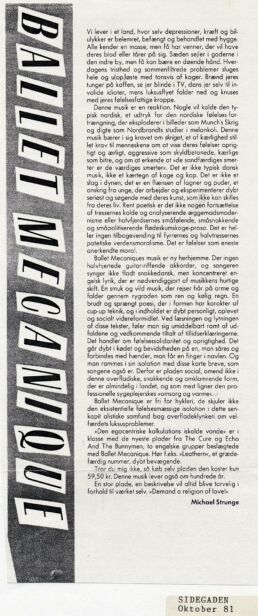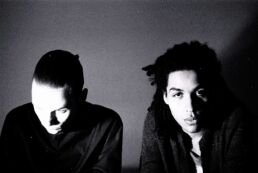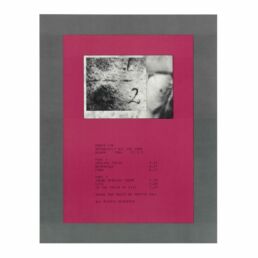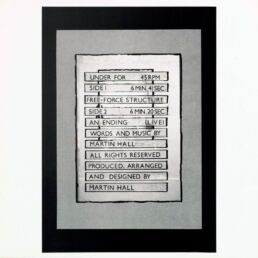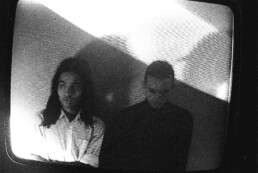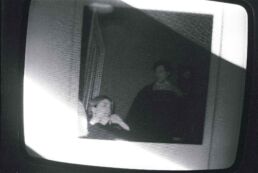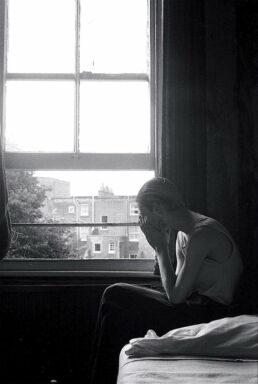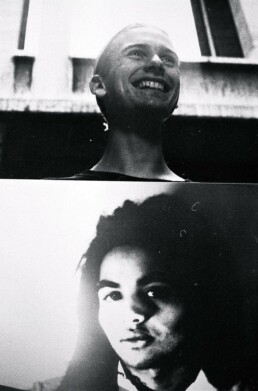Month: oktober 2023
BALLET MÉCANIQUE
BALLET MÉCANIQUE
Ballet Mécanique udgav deres første single Avenues of Oblivion i maj 1980 og albumdebuterede i september 1981 med The Icecold Waters of the Egocentric Calculation. Gruppens anden og sidste lp For udkom i efteråret 1982, hvorefter Martin Hall sammen med trommeslageren Michael Karshøj forsatte det musikalske projekt under navnet Under For.
Ballet Mécanique blandede rock, avantgarde og lyrik på en for samtiden ganske uhørt måde og benyttede bl.a. dansere, dias og film under deres shows. Gruppens gennemslagskraft og blivende resonans er bemærkelsesværdig.
The Icecold Waters of the Egocentric Calculation blev allerede ved sin udgivelse udråbt til et værk af rockhistoriske proportioner og figurerer stadig på bl.a. Politikens Rockleksikons liste over dansk rocks 50 vigtigste plader.
Du kan læse mere om gruppen og dens historie her:
- Ballet Mécanique på Roskilde Festival (1981)
- Martin Hall-interview om Ballet Mécanique (2003)
- Ballet Mécanique-essay (2006)
Ballet Mécanique, Fortropper 24-25-26/4/1981
Foto: Torben Voigt
Ballet Mécanique, Odd Fellow Palæet 11/6/1981
Foto: Gorm Valentin
Martin Hall, Roskilde Festival 27/6/1981
Foto: Søren Svendsen
Morten Versner, Roskilde Festival 27/6/1981
Foto: Søren Svendsen
Michael Karshøj, Roskilde Festival 27/6/1981
Foto: Søren Svendsen
Album-artwork 1981
Design: Martin Hall
Album-artwork 1981
Skulptur: Morten Versner
Ballet Mécanique, Nosferatu Festival 7/3/1982
Foto: Ole Dreyer
The Icecold Waters of the Egocentric Calculation 2006
Design: Martin Hall
UNDER FOR
UNDER FOR
Under For var Martin Halls musikalske fortsættelse af Ballet Mécanique-projektet, efter denne gruppe blev opløst i 1982. Hall og trommeslager Michael Karshøj begyndte herefter at arbejde sammen med støj- og avantgarde-guitaristen Per Hendrichsen, en musiker som Hall tidligere havde samarbejdet med i Pesteg Dred.
Under for udgav kun en enkelt studiealbum, pladen Apparently All the Same (1984), en titel der dog står som en af Halls væsentligste udgivelser i 80’erne. Under Fors legendariske koncert ved den klassiske festival ISCM World Music Days den 30. oktober 1983 er inkluderet på den digitale 2009-udgave af albummet.
Apparently All the Same var en af de få skandinaviske plader fra perioden, der ved sin udgivelse modtog god omtale i britiske musikaviser som New Musical Express og Sounds. I oktober 1984 udgav gruppen ligeledes 12”-singlen Free-Force Structure, en single der ligeledes fik en fin anmeldelse i NME. Yderligere medvirkede Under For i Claus Bohms film Totem fra samme år.
Apparently All the Same 1984
Design: Martin Hal
Free-Force Structure 12″-single 1984
Design: Martin Hal
Michael Karshøj og Martin Hall 1984
Foto: Henrik Möll
Lena Walsh og Per Hendrichsen 1983
Foto: Martin Hall
Martin Hall 1983
Foto: Lena Walsh
Martin Hall 1983 og Michael Karshøj 1984
Fotos: Jacob Thuesen/Henrik Möll
CATALYST
Liner notes fra Catalyst-opsamlingen
1. Intellectual Self-Mutilation (1982)
Recorded as a final statement of independence before splitting up Ballet Mécanique and leaving multinational label CBS. The single wasn’t released at the time, the group having no means to do so, but 24 years later Nat Inc. Productions made the planned limited edition 7” single available in 500 numbered copies. Very surprisingly the single entered the official Danish single chart at #26 in week 41, 2006.
2. Free-Force Structure (1984)
This 12” single was MH’s first full-blown “hi-tech” production although all sequencers were recorded manually at slowed down speed to establish the “feel”. Well received by NME at the time. In the following years the track became a classic in several European goth and electro clubs.
3. Warfare (1985)
One of MH’s personal favourites although his worst selling 12” ever. The song reflects his dissatisfaction with the general state of affairs back then, particularly the vanity and self-destruction of the artistic milieu he was part of: “You go to sleep one evening and the next day everything seems changed. As the French philosopher Jean Baudrillard puts it: What do you do after the orgy?"
4. Treatment (1985)
Written and recorded with Martin Krogh who committed suicide a few years later. The duo project Front & Fantasy only ever recorded this one song. Another frequently played club track.
5. Showdown (1986)
The fanfare of the Cutting Through album (title inspired by Chögyam Trungpa’s book Cutting Through Spiritual Materialism). This is a promo cut from the German release campaign. Samples and zeitgeist – the spirit of an age seems encapsulated in its sounds.
6. Crush (1986)
Taken from the same album. More Sturm und Drang disguised as pop music. Released as a single in Germany and three years later as a 12” in Denmark featuring this edited version.
7. Beat Of The Drum (1988)
The first single from the Presence album, big commercial break. The song ended up as the most played Danish single on the radio station The Voice that year, all in all a fairly traumatic experience for the artist. In retrospect the line “the way to solve a problem is to get a bigger one” seems like an almost prophetic statement as far as MH’s career is concerned.
8. Surreal Thing (1989)
A 12” remix of the “Real Thing” track, the second single from Presence. Reflecting on the strange events of the success of the album, MH wanted to add a “sur” to the title but at the time the record company didn’t. These days, we’re back on line.
9. Prime Material (1990)
Released as a 7” promo single by Virgin Records in relation to the Imperfect album. Recorded at his apartment. Who the girls are? We haven’t got a clue. A lot of people got lost in clubs during these years.
10. Cradlemoon (1996)
The album Random Hold represented a turning point for MH: For the first time in years he felt artistically satisfied with a record and the effort was met by overwhelming reviews. “Cradlemoon” was the opening track as well as the first single from the album. An archetypical Hall song.
11. Another Heart Laid Bare (1996)
Featured as the a-track on the Extended Play ep, a sentence from Charles Baudelaire’s Intimate Journals (My Heart Laid Bare) stroke the theme of the song: “Nations only produce great men in spite of themselves”. Up against the wall or pleasantly surprised? Well, let’s put it slightly different, yet another song about paranoia, hypocrisy and emotional prostitution.
12. Love In Vein (1998)
After the German release of Random Hold in 1997 MH recorded this track with Hamburg-based techno act Trauma for their forthcoming album Phase III. The song was featured as a promo cd-single and the Danish dandy was back in the machine parks of Frankfurt, Dortmund and Berlin. Some things never change.
13. Just A Feeling (1999)
This is a Thomas Li mix of an early version of the song recorded at The Dog House, a very small and claustrophobic studio (and a fair indication of the mental state of affairs at the time). Originally the track was called “Premonition”, later it became known as “Just a Feeling”, the second single from the Adapter album.
14. Burning Sugar (1999)
MH’s first top 5 hit in years as well as “the inescapable song of the week” on DR (a song of the week term used by The Danish National Radio). Not much to say. Pop music should be simple.
15. My Argentine Rose (2001)
Collaborating with visual artist Christian Skeel, this was MH’s follow-up single after the success with the gold-selling album Boel & Hall from 2000. Kind of gets the message across, don’t you think? Mesdames et messieurs, unzipping the abstract!
16. Minor Frame (2005)
Featured as the remix “Crowded Saturdays” on the Catalogue box, this a Johnny Stage remake of the original track – a digital “b-side” on the Introducing Roseland ep. Another of his personal favourites
17. Roseland (2005)
And here’s the a-side. A lot of airplay while announcing MH’s first concert in more than six years at the Danish castle Hindsgavl. Bombastic, yeah, sure, but isn’t that his middle name? Suggestions that this song was all about drug-taking didn’t really apply, rather it seemed like the short story version of a censored autobiography.
18. Damage Control (2006)
This is remix unit Winterhill’s version of the song, a bonus track on the cd-single entitled “Swimming Pool Eyes”. Whereas the original version was a classic disco cut, in retrospect this version actually comes closer to being the real thing. And yes, the vocals are supposed to sound like that.
19. Tout Le Monde (2008)
The grand finale on the Catalogue box was a soirée recording of “Tout Le Monde” on which MH was accompanied by legendary pianist and connoisseur Marquis Marcel de Sade. Re-recording the track in 2008 and adding a Hawaiian-like guitar played by Johnny Stage, renowned Danish artist Claus Beck-Nielsen Memorial perfected the new version with his harmony vocals. Download b-side of “Delirious”.
20. Delirious (2008)
Only using MH’s vocals and his original string arrangement, Marybell Katastrophy produced the new single “Delirious” in about one week’s time during the summer of 2008. The result? A classic pop tune caught in some kind of electroclash-like environment. Well, that’s really all up to you to decide ... no further comments. Thank you very much for your attention so far.

